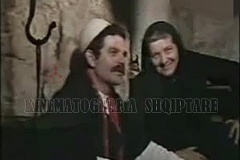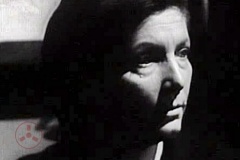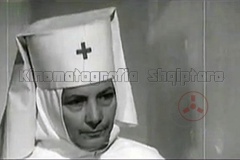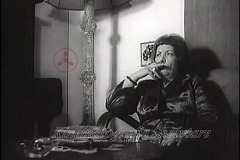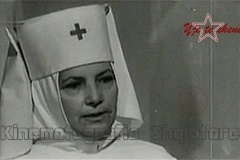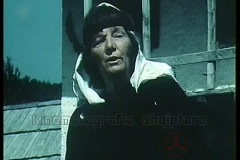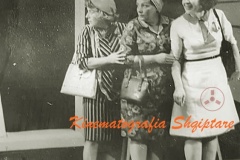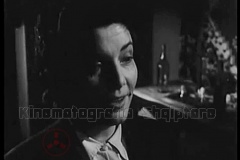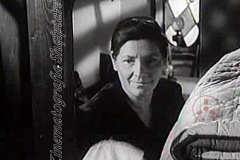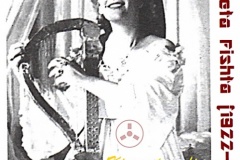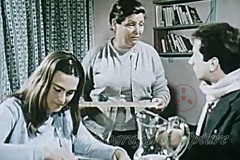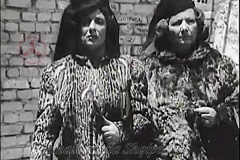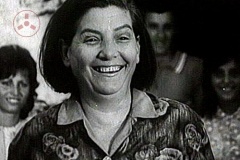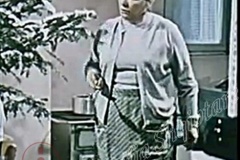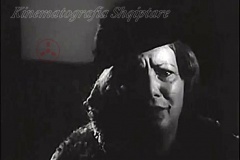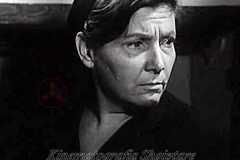Antoneta Fishta (1922-2006)
Actress of the dramatic Theater “Migjeni”, Shkoder!
Born on January 22, 1922 in Vienna (Austria). At a young age, around 5 years old, she lost the most precious person in his life, her mother Albina, who moved to Corfu, Greece, in 1928. There was nothing she could wiped away the little girl’s great bitterness. The beloved and precious voice of her mother returned to her forever. However, the “Stigmatine Sisters” offered caress, love and care to little Antonette. In the years 1928-1933, she attended primary school. Again, the warm shelter of feminine dreams are the hands of the mother and the human spirit of the nuns. At this age, the little girl will start her acting career in the interpretation of the theater plays “Ora e Shqypnise” with the role of Ciripupa and in the play “Xhexhuxhet” in the role of a little dwarf.
In v. 1941, Antoneta takes part in the drama “Marie Stewart” performing the main role. Meanwhile, she continues her studies at the “Donika Kastrioti” Normal School. In 1943, she graduated as a teacher. The noble mission of the teacher Antoneta begins in Suharek, Prizren, on February 16, 1944. After a year, in 1945, she returns to Shkoder, where in the period 1945-1948 she is a teacher in the “Parruce” School; “Jordan Misja”; and “Vasil Shanto”.
Her dream for art, his passion for the stage has never faded. In v. In 1945, she once participated in the artistic groups of the Union and the Teachers. It is not enough, but the activation is also started in Radio Shkodra. In the history of this radio, the chapter of the artistic life of the teacher Antoneta Fishta also has a place. With the students of the “Liria” school, for whom the teacher has a special weakness, she staged the melodrama “Harusha kercimtare” by Zef Harapi, where she herself plays the main role.
Antoneta Fishte’s artistic activity is divided into two periods: pre-professional and professional. In the first period, there are 8 dramas, in which she had main roles. It was at this time that the House of Culture was created, which has a choral group under the direction of the composer, the “People’s Artist”, Prenke Jakova, as well as a theater group under the direction of the director Andrea Skanjeti (who later deservedly received the title of “People’s Artist”).
During the time period 1945-1949, Antoneta Fishta unfolds her talent, clearly showing her passion. It is activated once in two groups. Precisely here, with the theater group, he plays in the dramas “Ceshtja ruse” performing the role of Jessi, “Portreti” in the role of the doctor, “Ishulli i paqes” in the role of Mrs. Jacobs, etc.
It is the year 1949. A marked event for the artistic life of Shkodra. The first nucleus of the theater group “Migjeni” is created, where Antoneta Fishta has signed her name. This is where her second artistic period as a professional begins. Performs in 70 Albanian and foreign dramas, leaving a rich gallery of roles, from which we can mention:
the role of Aferdite “Nen okupacion” (30-6-51) by Xh. Numbers;
Eliza in “Kopraci” (20-2-1952) by ZH.B Molier;
Lokja in “Toka jone” (27-02-1954) by Kole Jakove, (a role he played 91 times); Elmira in “Tartufi” (21-06-1955) by ZH.B Molier;
Catherine in “Tirani i Padoves” (27-09-1957) by V. Hygo;
Tringa in “Shate shaljanet” (28-02-1958) by N. Luca;
Larisa in “Histori Irkutase” (25-04-1961) by A. Arbuzov;
Helena in “Shtepi kukulle” (11-04-1963) by H. Ibsen;
Lidia Petrovna in “Year 61” (25-11-1961) by F. Pacram;
Medihaja in Fadil Pacrami’s “White and Black” was staged by director Esat Oktrova.
In addition to the stage in the theater, Antonete’s contribution is also visible in the cinematography, with about 12 films of Kinostudio:
“Special Task” (1963) ….Muzineja;
“Triumph over death (1967) …. Mother of Mira;
“White Streets” (1974)……Zane’s mother;
“War Path” (1974)…….The Nun
“The Happy Couple” (1975)…….The Girl’s Mother
“The Bride and the Curfew (1978)……the Rich Embroidery Lady
“The Days That Brought Spring” (1979) (TV) …. The villager who forgives the blood;
Radio Station (1979) …. Bourgeois Woman ;
New Mornings (1980) …. Ligor’s wife;
Freedom Road (1982) ….Mother
Mountain Flame (1982)……mountain woman
A name among men (1983)…..mother of greatness
Words without end (1986)……permanent employee
Presence and vocal tone make distinctive and authoritative actress. It is impossible to mention and analyze the entire gallery of characters created by Antoneta Fishta, but we can still single out some of them. The role of the two Catherines, two interpretations in the plays “Shterngata” by N. Ostrovsky (20-04-1956), and “The Tyrant of Padova” by V. Hygo (27-09-1957), performances of the veins on stage by the director and “People’s Artist”, Lec Shllaku.
In Ostrovsky’s Katerina, the role of the monologue, although relatively long, “convinces” and does not bore the spectator who followed it with care and attention. During this interpretation, the actress maintains many nuances, which deepen, escalate and gradually become explosive.
“Monologue of the key” is a climax of Antonete’s artistic interpretation. While in the other Katerina, in “The Tyrant of Padova”, the actress preferred to draw the character with a natural simplicity, quality and high spiritual feeling, giving her universality and human space. The role of Loke in the drama “Toka e jone” (1954), opens a new chapter of interpretation for the actress. It is a test that she faced professionally, giving Loke`s character everything human, breath and artistic fullness. She remained in the same relationship Antonete – Loke, also gave her a strong character, quality and moral qualities to be able to face the difficult situations she would encounter. And during the interpretation of the role of Tringa in “7 shaljanet” (1958), the actress preserved and artistically manifested the character of the mountain woman. In this character was treated with manly and stoic nuances, legitimate.
Antoneta has a even stronger connection. In all the transitions through specific situations or even those in the development of the character, the actress convincingly entered into the unfolding of her inner world, without sparing enough of her acting and human qualities. The figure of the Nun in the drama “Migjeni” by the author Tom Shoshi, staged by the director Esat Oktrova (AP) on February 18, 1965, Fishta interprets the role of a nun who definitely reminds her of her painful childhood. In this figure, sincerity, clarity, spiritual purity, mercy, sacrifice, and deep human feeling stand out. All these virtues are clothed with a divine love. She dances like a sister on Migjen’s head, as a hope and dream, pain and light….
And last but by no means the last, is the role of one of the three godchildren in Sheri Mita’s comedy, “Keshilli i ndrikullave” ( 19-10-1969) that was put on stage by the well-known director and actor Serafin Fanko (AP). Who remembers even smiling with this face even though many years have passed. This is also the merit of this actress like Antoneta Fishta. Every action, joke or situation she pays due attention to the role of the third godchild. Each movement is in development above, through the circumstances that are presented to the godfather character, which has come out as alive and believable. To give the third godchild more comedy and grotesque, the actress chose the line of serious interpretation.
Even though the figure is in this hole, the witch remains a skillfully drawn caricature, where all her distinguishing features are struck and engraved, such as: gossip-carrying charlatan, jealous, gossipy, selfish, etc. The figure preserves an interesting construction. In every situation she is in, she “unfolds” during the interpretation of the actress Antoneta Fishta. The figure of the third godmother performed by Fishta together with the other two godmothers, performed by Vitore Nino and Tinka Kurt, (Cici, Bella and Domenika) and together with the famous Leo (Latif), played brilliantly by Tano Banushi (AP); created a polyphote interpretation in the genre of comedy, of this comedy that takes a deserved place, which shines with its values and messages.
Antoneta Fishta spent her old age in her hometown covered by memories, she lived with them, they started and took life as she “talked” with the photo albums, which embodied her life as an actress over the years…
“I was very lucky. that I also had as a life partner and husband, Lec Fishta, the scenographer of the “Migjeni” Theater, the author of 200 premieres (theatre-estrade-puppet theater), who, besides being a good life partner, has been a colleague for me, with which I have discussed and solved many big artistic and interpretation problems. There was also the wonderful audience of Shkodran, which with their respect and applause, gave me the strength to put all my talent to work at the service of the theater scene.
The actress passed away on October 26, 2006 in Italy at the age of 84. She rests in peace in the Catholic cemetery of Shkodra.
Below is the album dedicated to Mrs. A. Fishta on Facebook
_________________
Albanian Cinematography in activity since 2013
Reference: “Memory of a city” – Alba 2019 / XH. Bushati / p. 40-44. The photos are a contribution of the administrators of “Albanian Cinematography”
Follow us: Blog: https://albaniancinematography.blogspot.com/ Vimeo: Albanian Cinematography (vimeo.com) Facebook: https://www.facebook.com/ksh.faqjazyrtare Dailymotion: https://www.dailymotion.com/kinetografiashqiptareartisporti YouTube: https://www.youtube.com/channel/UCDRYQ5xCyGkfELm3mX8Rhtw
Discover more from Albanian Cinematography - Sport
Subscribe to get the latest posts sent to your email.

